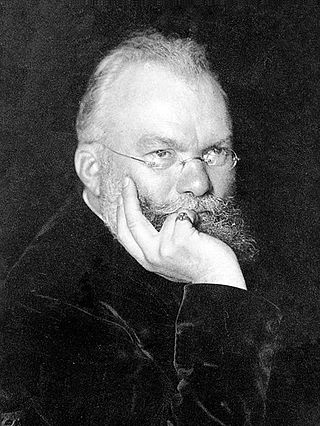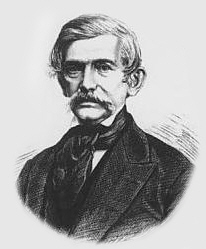
The master race is a pseudoscientific concept in Nazi ideology in which the putative "Aryan race" is deemed the pinnacle of human racial hierarchy. Members were referred to as "Herrenmenschen".

Heinrich Gotthard Freiherr von Treitschke was a German historian, political writer and National Liberal member of the Reichstag during the time of the German Empire. He was an extreme nationalist, who favored German colonialism and opposed the British Empire. He also opposed Catholics, Poles, Jews and socialists inside Germany.
The concept of race as a categorization of anatomically modern humans has an extensive history in Europe and the Americas. The contemporary word race itself is modern; historically it was used in the sense of "nation, ethnic group" during the 16th to 19th centuries. Race acquired its modern meaning in the field of physical anthropology through scientific racism starting in the 19th century. With the rise of modern genetics, the concept of distinct human races in a biological sense has become obsolete. In 2019, the American Association of Biological Anthropologists stated: "The belief in 'races' as natural aspects of human biology, and the structures of inequality (racism) that emerge from such beliefs, are among the most damaging elements in the human experience both today and in the past."
Fritz Fischer was a German historian best known for his analysis of the causes of World War I. In the early 1960s Fischer advanced the controversial thesis at the time that responsibility for the outbreak of the war rested solely on Imperial Germany. Fischer's anti-revisionist claims shocked the West German government and historical establishment, as it made Germany guilty for both world wars, challenging the national belief in Germany's innocence and converting its recent history into one of conquest and aggression.

Britannia Superior was a province of Roman Britain created after the civil war between Septimius Severus and Clodius Albinus. Although Herodian credits Severus with dividing Roman Britain into the Northern territory of Britannia Inferior and the Southern territory of Britannia Superior, modern scholarship argues that it is more likely that Caracalla was the person who made the split sometime in the early 3rd century CE. The previous British capital Londinium remained the centre of Britannia Superior while Eboracum, or modern York was the capital of Britannia Inferior. Epigraphical evidence shows that Upper Britain encompassed approximately what is now Wales, southern England and East Anglia. However, the official boundary between Britannia Superior and Inferior is still unclear.
Takao Ozawa v. United States, 260 U.S. 178 (1922), was a US legal proceeding. The United States Supreme Court found Takao Ozawa, a Japanese American who was born in Japan but had lived in the United States for 20 years, ineligible for naturalization. In 1914, Ozawa filed for United States citizenship under the Naturalization Act of 1906. This act allowed only "free white persons" and "persons of African nativity or persons of African descent" to naturalize. Ozawa did not challenge the constitutionality of the racial restrictions. Instead, he claimed that Japanese people should be properly classified as "free white persons".

Inventio, one of the five canons of rhetoric, is the method used for the discovery of arguments in Western rhetoric and comes from the Latin word, meaning "invention" or "discovery". Inventio is the central, indispensable canon of rhetoric, and traditionally means a systematic search for arguments.
Nordicism is an ideology which views the historical race concept of the "Nordic race" as an endangered and superior racial group. Some notable and influential Nordicist works include Madison Grant's book The Passing of the Great Race (1916); Arthur de Gobineau's An Essay on the Inequality of the Human Races (1853); the various writings of Lothrop Stoddard; Houston Stewart Chamberlain's The Foundations of the Nineteenth Century (1899); and, to a lesser extent, William Z. Ripley’s The Races of Europe (1899). The ideology became popular in the late-19th and 20th centuries in Germanic-speaking Europe, Northwestern Europe, Central Europe, and Northern Europe, as well as in North America and Australia.

Karl Gotthard Lamprecht was a German historian who specialized in German art and economic history.
Audism as described by deaf activists is a form of discrimination directed against deaf people, which may include those diagnosed as deaf from birth, or otherwise. Tom L. Humphries coined the term in an unpublished manuscript in 1975, which he later reiterated in his doctoral project in 1977, but it did not start to catch on until Harlan Lane used it in his writing. Humphries originally applied audism to individual attitudes and practices; whereas Lane broadened the term to include oppression of deaf people.

John William Burgess was an American political scientist. He spent most of his career at Columbia University where he in 1880 created the first graduate school in Political Science. He has been described as "the most influential political scientist of the period" and "the father of American political science."

Christoph Meiners was a German racialist, philosopher, historian, and writer born in Warstade. He supported the polygenist theory of human origins. He was a member of the Göttingen school of history.

Keywords: A Vocabulary of Culture and Society is a book by the Welsh Marxist academic Raymond Williams published in 1976 by Croom Helm.

Nazi archaeology was a field of pseudoarcheology led and encouraged by various Nazi leaders and Ahnenerbe figures, such as Adolf Hitler and Heinrich Himmler, which directed archaeologists and other scholars to search Germany's archeological past in order to find material evidence supporting an advanced, Aryan ancestry as alleged and espoused by the ultranationalist Nazi Party.

Johann Georg Kohl was a German travel writer, historian, and geographer.

Friedrich Wilhelm "Fritz" von Frantzius (1865-1917) was a German-born American banker, broker and bookkeeper.
To be ridiculous is to be something highly incongruous or inferior, sometimes deliberately so to make people laugh or get their attention, and sometimes unintendedly so as to be considered laughable and earn or provoke ridicule and derision. It comes from the 1540s Latin "ridiculosus" meaning "laughable", from "ridiculus" meaning "that which excites laughter", and from "ridere" meaning "to laugh". "Ridiculous" is an adjective describing "the ridiculous".

Mediterraneanism is an ideology that claims that there are distinctive characteristics that Mediterranean cultures have in common.

Clotilde Margarete Anna Edle von der Planitz, known professionally as Clotilde von Derp, was a German expressionist dancer, an early exponent of modern dance. Her career was spent essentially dancing together with her husband Alexander Sakharoff with whom she enjoyed a long-lasting relationship.

Cultural racism, sometimes called neo-racism, new racism, postmodern racism, or differentialist racism, is a concept that has been applied to prejudices and discrimination based on cultural differences between ethnic or racial groups. This includes the idea that some cultures are superior to others or in more extreme cases that various cultures are fundamentally incompatible and should not co-exist in the same society or state. In this it differs from biological or scientific racism, which refers to prejudices and discrimination rooted in perceived biological differences between ethnic or racial groups.
2. Matthews, B. (1914, September 20). Germans as exponents of culture. New York Times, p. 14.














